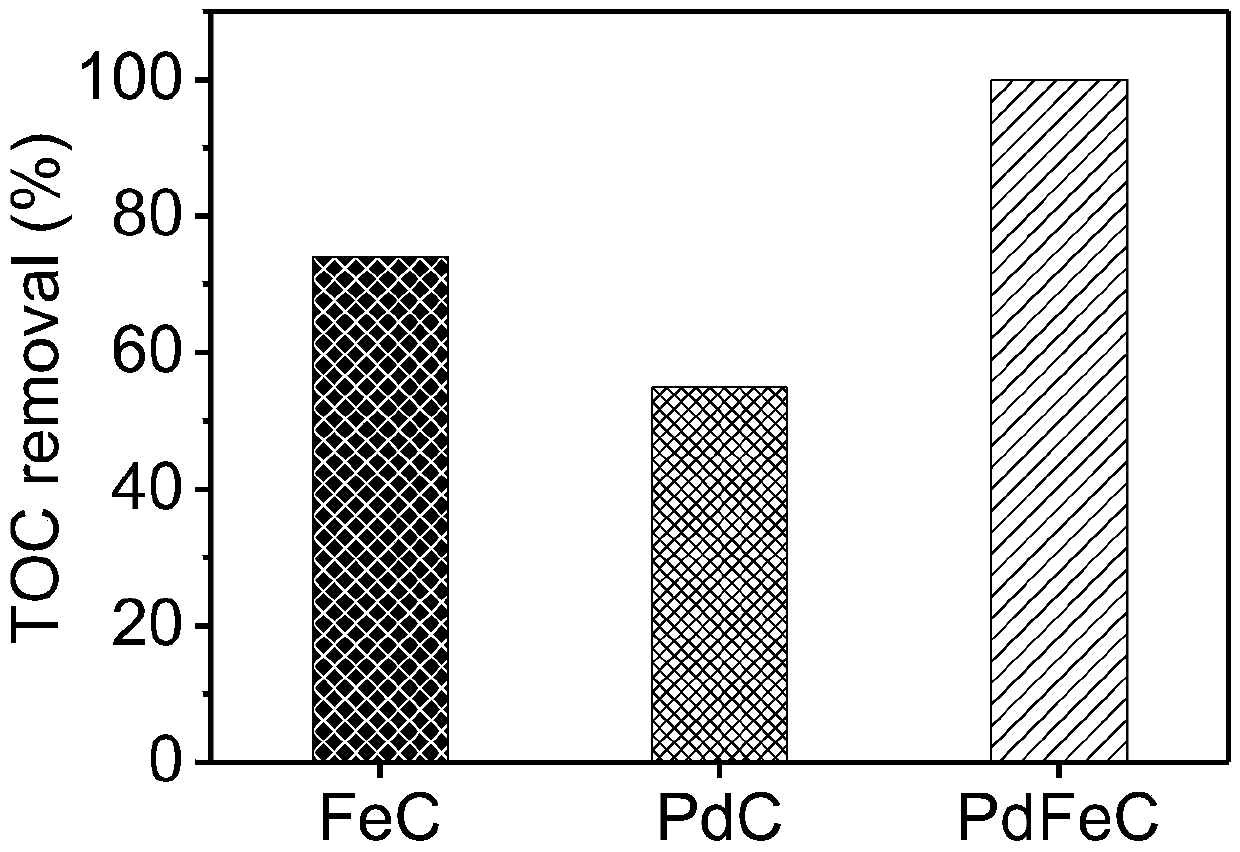Electrode material suitable for Electro-Fenton depredation of pollutants, preparation method and application
A technology for electrode materials and pollutants, applied in the field of electrode materials for electro-Fenton degradation of pollutants, can solve the problems of low oxygen reduction 2 electron selectivity, unstable catalyst structure, low dehalogenation efficiency, etc., and achieves a basic particle size. Consistent, easily controlled reaction conditions, uniform particle distribution
- Summary
- Abstract
- Description
- Claims
- Application Information
AI Technical Summary
Problems solved by technology
Method used
Image
Examples
Embodiment 1
[0047] For heterogeneous E-Fenton system H 2 o 2 Due to the problems of low yield, low dehalogenation efficiency, and unstable catalyst construction, a method for preparing a carbon airgel cathode with in-situ formation of PdFe nano-alloy and defective carbon is provided, which improves the stability of the electrode and the oxygen The reduced 2-electron selectivity enhances the ability to generate OH radicals and endows the electrode with the ability to reductively dehalogenate the active hydrogen. When applied to the degradation of halogen-containing organic pollutants, a cathodic reduction-oxidation synergistic electrochemical system was established to achieve efficient and complete mineralization degradation of 3-chlorophenol.
[0048] The specific preparation steps of PdFe nano-alloy carbon airgel in this embodiment are as follows:
[0049] (1) Weigh an appropriate amount of resorcinol, formaldehyde, water, and sodium carbonate, and then mix them with a molar ratio of r...
Embodiment 2
[0052] For heterogeneous E-Fenton system H 2 o 2 Due to the problems of low yield, low dehalogenation efficiency, and unstable catalyst construction, a method for preparing a carbon airgel cathode with in-situ formation of PdFe nano-alloy and defective carbon is provided, which improves the stability of the electrode and the oxygen The reduced 2-electron selectivity enhances the ability to generate OH radicals and endows the electrode with the ability to reductively dehalogenate the active hydrogen. In order to improve the safety of drinking water and reduce the risk of carcinogenicity in drinking water, when this electrode is applied to the degradation of disinfection by-products of haloacetamides ubiquitous in tap water, a cathodic reduction-oxidation synergistic electrochemical system is established to realize a Rapid dehalogenation pathway.
[0053] (1) Weigh an appropriate amount of resorcinol, formaldehyde, water, and sodium carbonate, and then mix them with a molar ra...
Embodiment 3
[0056] For heterogeneous E-Fenton system H 2 o 2 Due to the problems of low yield, low dehalogenation efficiency, and unstable catalyst construction, a method for preparing a carbon airgel cathode with in-situ formation of PdFe nano-alloy and defective carbon is provided, which improves the stability of the electrode and the oxygen The reduced 2-electron selectivity enhances the ability to generate OH radicals and endows the electrode with the ability to reductively dehalogenate the active hydrogen. Using advanced transmission electron microscopy, X-ray diffraction and Raman spectroscopy characterization techniques, it was shown that the structure of alloys and defective carbon was formed in situ in carbon aerogels.
[0057] (1) Weigh an appropriate amount of resorcinol, formaldehyde, water, and sodium carbonate, and then mix them with a molar ratio of resorcinol: formaldehyde: water: sodium carbonate of 1.5:2:17.5:0.0008, and mix well. After stirring evenly, add: (i)m Fe / ...
PUM
 Login to View More
Login to View More Abstract
Description
Claims
Application Information
 Login to View More
Login to View More - R&D Engineer
- R&D Manager
- IP Professional
- Industry Leading Data Capabilities
- Powerful AI technology
- Patent DNA Extraction
Browse by: Latest US Patents, China's latest patents, Technical Efficacy Thesaurus, Application Domain, Technology Topic, Popular Technical Reports.
© 2024 PatSnap. All rights reserved.Legal|Privacy policy|Modern Slavery Act Transparency Statement|Sitemap|About US| Contact US: help@patsnap.com








